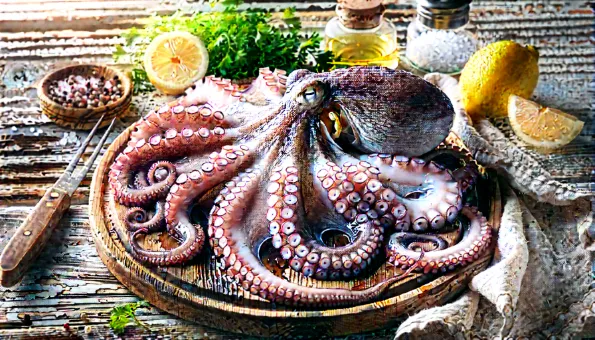Octopus: Lean, Mineral-Rich Seafood (Tender Then Charred)
Mild, slightly sweet meat—high in protein, B12 and selenium. Best cooked gently until tender, then quickly grilled.

What Is Octopus?
Octopus is a **cephalopod** with firm flesh that becomes tender with proper cooking. It’s popular in Mediterranean and East Asian cuisines—think **pulpo a la gallega**, **takoyaki**, or charred octopus salads.
Nutrition Profile
Per 100 g cooked: **~160–170 kcal**, **~29 g protein**, **~2–3 g fat** (some omega-3), **vitamin B12**, **selenium**, **copper**, **iron**, **taurine**; naturally **low in carbs** and **low sodium** (before seasoning).
Benefits
- **High-quality protein** with few calories.
- **B12, iron & copper** support blood and energy metabolism.
- **Selenium & taurine** offer antioxidant and cellular support.
- **Omega-3** contributes to heart & brain health.
Possible Downsides
- **Can be tough** if undercooked—needs slow simmer/pressure cook before searing.
- **Cholesterol & sodium** may be high depending on preparation (e.g., cured/grilled with salty rubs).
- **Seafood allergies** possible; octopus is a **mollusk**.
- **Sourcing** varies—prefer responsibly caught products.
How to Use
- **Tenderize first:** simmer in aromatics **45–90 min** (size-dependent) or **pressure cook 15–20 min**; cool in its liquid.
- **Finish hot & fast:** grill or pan-sear to char the exterior.
- **Serve:** with olive oil, lemon, paprika & potatoes; or slice into **salads, pasta, or rice**; dice for **takoyaki**.
- **Cleaning:** remove beak and internal organs (often done by fishmonger).
Tip
For extra tenderness, **freeze then thaw** before cooking, or add a light **3% brine (1–2 h)**. Skip the wine-cork myth—**time and gentle heat** are what work.
- 1. Octopus
Octopus – morski mekušac (glavonožac) s čvrstim, ali sočnim mesom; traži omekšavanje (kuhanje/pressure cooker) pa kratko pečenje/gril

